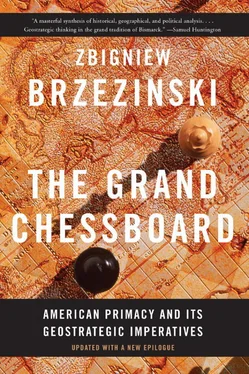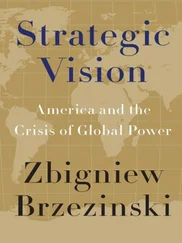In brief, America stands supreme in the four decisive domains of global power : militarily, it has an unmatched global reach; economically, it remains the main locomotive of global growth, even if challenged in some aspects by Japan and Germany (neither of which enjoys the other attributes of global might); technologically, it retains the overall lead in the cutting-edge areas of innovation; and culturally, despite some crassness, it enjoys an appeal that is unrivaled, especially among the world’s youth—all of which gives the United States a political clout that no other state comes close to matching. It is the combination of all four that makes America the only comprehensive global superpower.
THE AMERICAN GLOBAL SYSTEM
Although America’s international preeminence unavoidably evokes similarities to earlier imperial systems, the differences are more essential. They go beyond the question of territorial scope. American global power is exercised through a global system of distinctively American design that mirrors the domestic American experience. Central to that domestic experience is the pluralistic character of both the American society and its political system.
The earlier empires were built by aristocratic political elites and were in most cases ruled by essentially authoritarian or absolutist regimes. The bulk of the populations of the imperial states were either politically indifferent or, in more recent times, infected by imperialist emotions and symbols. The quest for national glory, “the white man’s burden,” “la mission civilisatrice,” not to speak of the opportunities for personal profit—all served to mobilize support for imperial adventures and to sustain essentially hierarchical imperial power pyramids.
The attitude of the American public toward the external projection of American power has been much more ambivalent. The public supported America’s engagement in World War II largely because of the shock effect of the Japanese attack on Pearl Harbor. The engagement of the United States in the Cold War was initially endorsed more reluctantly, until the Berlin blockade and the subsequent Korean War. After the Cold War had ended, the emergence of the United States as the single global power did not evoke much public gloating but rather elicited an inclination toward a more limited definition of American responsibilities abroad. Public opinion polls conducted in 1995 and 1996 indicated a general public preference for “sharing” global power with others, rather than for its monopolistic exercise.
Because of these domestic factors, the American global system emphasizes the technique of co-optation (as in the case of defeated rivals—Germany, Japan, and lately even Russia) to a much greater extent than the earlier imperial systems did. It likewise relies heavily on the indirect exercise of influence on dependent foreign elites, while drawing much benefit from the appeal of its democratic principles and institutions. All of the foregoing are reinforced by the massive but intangible impact of the American domination of global communications, popular entertainment, and mass culture and by the potentially very tangible clout of America’s technological edge and global military reach.
Cultural domination has been an underappreciated facet of American global power. Whatever one may think of its aesthetic values, America’s mass culture exercises a magnetic appeal, especially on the world’s youth. Its attraction may be derived from the hedonistic quality of the lifestyle it projects, but its global appeal is undeniable. American television programs and films account for about three-fourths of the global market. American popular music is equally dominant, while American fads, eating habits, and even clothing are increasingly imitated worldwide. The language of the Internet is English, and an overwhelming proportion of the global computer chatter also originates from America, influencing the content of global conversation. Lastly, America has become a Mecca for those seeking advanced education, with approximately half a million foreign students flocking to the United States, with many of the ablest never returning home. Graduates from American universities are to be found in almost every Cabinet on every continent.
The style of many foreign democratic politicians also increasingly emulates the American. Not only did John F. Kennedy find eager imitators abroad, but even more recent (and less glorified) American political leaders have become the object of careful study and political imitation. Politicians from cultures as disparate as the Japanese and the British (for example, the Japanese prime minister of the mid-1990s, Ryutaro Hashimoto, and the British prime minister, Tony Blair—and note the “Tony,” imitative of “Jimmy” Carter, “Bill” Clinton, or “Bob” Dole) find it perfectly appropriate to copy Bill Clinton’s homey mannerisms, populist common touch, and public relations techniques.
Democratic ideals, associated with the American political tradition, further reinforce what some perceive as America’s “cultural imperialism.” In the age of the most massive spread of the democratic form of government, the American political experience tends to serve as a standard for emulation. The spreading emphasis worldwide on the centrality of a written constitution and on the supremacy of law over political expediency, no matter how short-changed in practice, has drawn upon the strength of American constitutionalism. In recent times, the adoption by the former Communist countries of civilian supremacy over the military (especially as a precondition for NATO membership) has also been very heavily influenced by the U.S. system of civil-military relations.
The appeal and impact of the democratic American political system has also been accompanied by the growing attraction of the American entrepreneurial economic model, which stresses global free trade and uninhibited competition. As the Western welfare state, including its German emphasis on “codetermination” between entrepreneurs and trade unions, begins to lose its economic momentum, more Europeans are voicing the opinion that the more competitive and even ruthless American economic culture has to be emulated if Europe is not to fall further behind. Even in Japan, greater individualism in economic behavior is becoming recognized as a necessary concomitant of economic success.
The American emphasis on political democracy and economic development thus combines to convey a simple ideological message that appeals to many: the quest for individual success enhances freedom while generating wealth. The resulting blend of idealism and egoism is a potent combination. Individual self-fulfillment is said to be a God-given right that at the same time can benefit others by setting an example and by generating wealth. It is a doctrine that attracts the energetic, the ambitious, and the highly competitive.
As the imitation of American ways gradually pervades the world, it creates a more congenial setting for the exercise of the indirect and seemingly consensual American hegemony. And as in the case of the domestic American system, that hegemony involves a complex structure of interlocking institutions and procedures, designed to generate consensus and obscure asymmetries in power and influence. American global supremacy is thus buttressed by an elaborate system of alliances and coalitions that literally span the globe.
The Atlantic alliance, epitomized institutionally by NATO, links the most productive and influential states of Europe to America, making the United States a key participant even in intra-European affairs. The bilateral political and military ties with Japan bind the most powerful Asian economy to the United States, with Japan remaining (at least for the time being) essentially an American protectorate. America also participates in such nascent trans-Pacific multilateral organizations as the Asia-Pacific Economic Cooperation Forum (APEC), making itself a key participant in that region’s affairs. The Western Hemisphere is generally shielded from outside influences, enabling America to play the central role in existing hemispheric multilateral organizations. Special security arrangements in the Persian Gulf, especially after the brief punitive mission in 1991 against Iraq, have made that economically vital region into an American military preserve. Even the former Soviet space is permeated by various American-sponsored arrangements for closer cooperation with NATO, such as the Partnership for Peace.
Читать дальше












